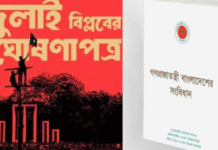An untold rape, life thereafter

There are special laws and special courts to ensure justice for rape survivors. And yet, justice for most of them remains forever illusive. There are at least three guilty parties here — defective investigation, incompetent prosecution and the law that favours the accused.
The result is this: 97pc rape cases in Dhaka alone see no conviction.
In this three-part series by Bishakha Devnath, The Daily Star tries to shed some light on all these elements responsible for the failure of the justice system, through some untold yet compelling stories of rape survivors.
At the tender age of 13, when she should be out playing with friends or studying, her life now revolves around tending to a son born out of rape.
The crime, which led to her dropping out of school after completion of her primary education in Jafrakhali, Barguna, three years back, would impact every part of her life. While she and the child struggle every day, the accused continues to lead a normal life until a conviction is given.
How long the trial would take is uncertain; in fact, it has just begun nearly two years after the filing of the rape case.
Meanwhile, Abdul Mannan, the accused, was granted bail by the High Court in July last year. He had been imprisoned for eight months after his surrender at the Women and Children Repression Prevention Tribunal in November 2016.
In the latest development, the special tribunal framed charges against him in January this year and accepted a request for a DNA test. DNA samples have been collected from the victim and the baby but the accused hasn’t come to Dhaka to give his sample yet despite being repeatedly asked by the investigation officer.
In the last hearing yesterday, the lower court asked him to give his sample before the next hearing in April, said advocate Salma Sultana of Bangladesh Society for the Enforcement of Human Rights.
Frustrated, the victim’s brother called The Daily Star after coming back from court. “How could the accused walk away [since he is on HC bail] just like that even after he hadn’t complied with the earlier court order [to give DNA sample]. It really hurts…. that he can have a normal life,” he said.
DAYS OF HORROR
The victim had been enduring the trauma of what happened in her aunt’s house in the capital’s Merul Badda until seven months into her pregnancy.
Her brother, Khaled, not his real name, aged 22, said he could not believe when a Tongi hospital found his sister to be pregnant.
A few questions and the harrowing tale came rushing out of the young girl’s mouth.
It all began when the girl was 10 years old. Mannan, four times her age, used to try to physically abuse her every day to and from her way to school in Jafrakhali under Bamna thana, she claimed.
Her family tried to stop Mannan and informed his family but they rubbished their allegations and called them liars. To escape, the girl came to Dhaka in 2015. However, she could not escape Mannan. He eventually found her address and then came to Dhaka, where the girl was living with her aunt. On June 6, 2015, Mannan tricked his way into the rented house when she was alone.
He allegedly raped her before leaving with a warning: tell anyone about the incident and he would kill her.
The devil came to her doorstep three more times within a month and raped her, the girl claimed when recounting the days she wants to forget.
Try as she may though, her baby and the legal battle always bring her back to the reality of the situation.
Every time, Mannan raped her, he dangled the fear of death over her. It drained her of the will to speak up, scream and let others know of the injustice she was being put through, she said while talking to The Daily Star on a Friday afternoon in January.
BECOMING A PARIAH
It took a while for the victim’s family to muster up the courage to file a case. When they went to the police, they were advised to file a rape case with the special tribunal because of the delay.
A medical report was necessary and so Khaled took his sister to Maternal Child Health and Training Institute, Azimpur. As per the ultrasound report submitted to the court, along with other case documents, the girl was 33 weeks pregnant on March 14, 2016.
The report also mentions Mannan, the “rapist”, as her “husband”.
“The hospital staffers were asking for the name of her husband,” Khaled said. “What could I do? I called the lawyer and asked him. He told me to give the rapist’s name.”
Khaled and his sister would find themselves in such difficult situations every now and then.
The duo and their older sister recently moved to a new house in Uttara. This was to escape neighbours constantly asking about the “missing father”.
“While renting this house, we told the house owner and people living nearby that her husband left her,” Khaled said, sitting in his two room house, when explaining why he was initially hesitant to give the address to The Daily Star.
“Locals around our previous house got to know the story,” he added.
All three siblings started living in Dhaka in 2016 because they had been threatened by Abdul Mannan and his family members in the village. “They are influential there. Mannan owns land and his children are working abroad, so they have money,” Khaled said.
His widowed mother started living in her parental house in the same village after family members of the accused hurled abuse at her and physically attacked her on several occasions.
Against this backdrop, Khaled is pursuing the legal battle with whatever little he earns as a garment worker. After all, he is the only guardian who can fight for his young sister and the baby boy.
QUEST FOR JUSTICE
However, as time ticks by, his desperation grows.
Every time, he has to bring his two children, the victim and the baby, all the way from his residence to court and then return home awaiting the next hearing. He knocks the doors of whoever he thinks can help — the media, lawyers, legal aid agencies.
Months after the submission of the judicial inquiry report in April 2016 to the special court, he approached advocate Mizanur Rahman in his chamber and drew his attention to his sister’s ordeal. The lawyer stood by him free of charge in the next court hearing on the inquiry report, along with the public prosecutor.
“That day [July 25, 2016] the court passed the arrest warrant,” Khaled said. He felt he had come one step closer to the justice they were seeking.
The accused remained missing for months. On November 2 of the year, he surrendered to the court with a bail prayer. The bail was rejected and he was sent to prison.
After Mannan was released on the HC bail, Khaled claimed he came across him at Jafrakhali Bazar during Eid last year. Mannan didn’t miss the opportunity; he threatened to harm Khaled and his family.
Enquiring whether the accused had filed any other appeal with the HC, Khaled learnt he had prayed to the court for the case’s transfer to a Barguna court.
Fearing that everything would go in Mannan’s favour if the trial took place in the district as the accused was an influential local, he went to the office of the Supreme Court Legal Aid, the government agency that extends legal support to poor people. The legal aid office assigned a lawyer to deal “with the case with care.”
Khaled could not trust the state counsel assigned to represent the victim at court. He, in fact, never had the opportunity to talk to the deputy attorney general in or outside the HC.
In this regard, human rights lawyer Salma Ali over the phone said, “State counsels remain overburdened with cases [of different types] so the rape cases are of little significance [to them].”
Often cases lose their ground due to the lack of coordination or cooperation, she said, adding that commitment and women-friendly environment are a must to ensure justice in rape cases.
Besides, a neutral committee should be formed to monitor the progress from time to time in the trial of rape cases, and accountability of all involved in the trial be ensured, Salma noted.
It was felt to be so true when Khaled, with The Daily Star correspondent, spent two days in the second week of January to find out what order was issued in the last hearing at the HC on December 13, 2017.
Running between desks for hours, it was dug out that the defence had withdrawn its appeal with the HC and so there was no bar to the case proceeding to the lower court.
Without the HC order, the special tribunal would not hold the hearing on the scheduled date — January 18 this year. But everyone — from lawyers to office clerks engaged in writing draft orders, keeping records and sending the orders to the disperse section– had different versions and suggestions.
Finally, The Daily Star knocked the door of one of the honourable judges at the back of the court room, seeking help. He was ready to talk when convinced he would not be named by the media.
Listening to the case history, he called in one office clerk and asked him to communicate the order immediately so that the lower court could resume the case proceedings.
Thanks to him and another HC administrative official, who also wished not to be named, Khaled finally got the HC order copy.
While Khaled was insisting on getting the copy, an office clerk named Riyad said important orders like bail orders get issued immediately, but the orders like the one Khaled needed remain buried under piles of papers for months.
Khaled took out a note of Tk 500 in a gesture of what is so well-known in the court premises — lobbying — so he could expedite the process. As the copy reached the disperse section, Khaled went along with the court staff carrying the signed order to the special tribunal, as suggested by the administrative official.
His effort didn’t go to waste as the hearing was finally held but there is probably a long journey ahead.
Source: The Daily Star.









